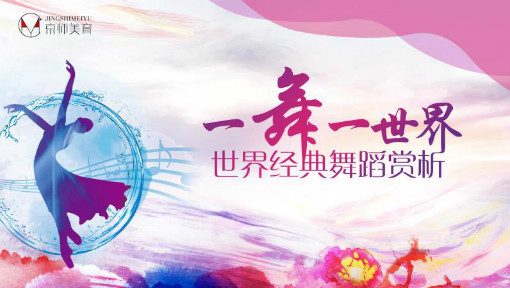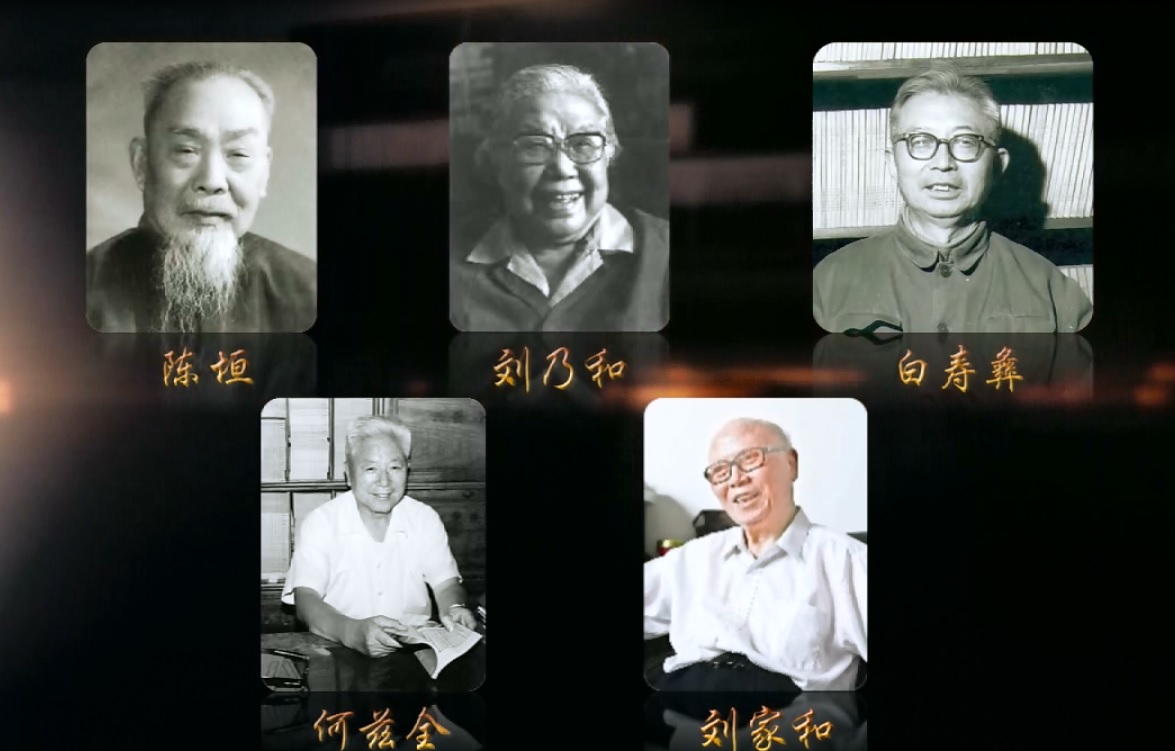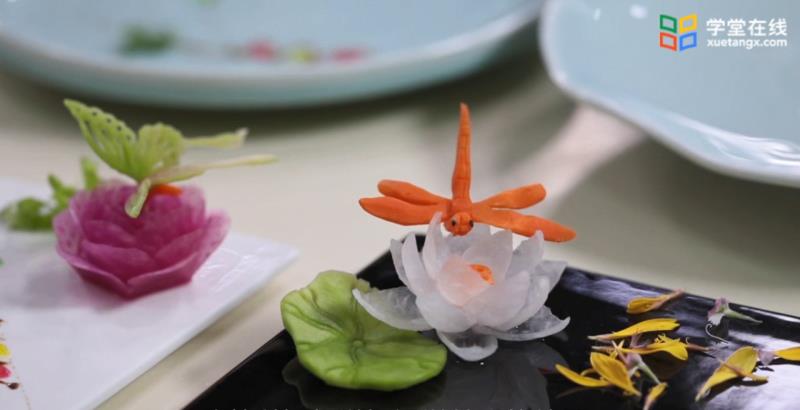
当前课程知识点:Overview of China > 第四章 欣赏中国 Appreciating China > 4.4 书画欣赏 Appreciation of Painting and Calligraphy > 4.4.3 中国画的工具及分类 Tools and Classification of Chinese Painting
返回《Overview of China》慕课在线视频课程列表
朋友 您好
Hello friends
欢迎您走进中国
Welcome to the Overview of China
了解更多关于中国的知识
and know more about China
今天 我们继续了解
Today, we continue to understand
中国绘画的工具及分类
the tools and classifications of Chinese painting
中国的绘画称为
Painting in China is called
中国画
Traditional Chinese painting
简称 国画
Referred to as Chinese Painting
主要指的是
Mainly refers to
用毛笔蘸水 墨 彩等
the use of a brush dipped in water, ink, color, etc.
画在绢 宣纸 帛上
Scroll painting on silk, rice paper,
并加以装裱的卷轴画
sackcloth and mounting
国画是中国的传统绘画形式
Chinese painting is a traditional form of painting in China
绘画工具和材料
Painting tools and materials:
绘画工具和材料主要是
Painting tools and materials are
文房四宝
the Four Treasures of Study
笔 墨 纸 砚
Writing brush, ink stick, paper and ink slab.
此外还有颜料 笔帘
In addition, there are pigments, pen curtains
笔洗 调色碟子
pen wash, and color plates.
乳钵 垫毡 镇尺 界尺等等
Mortar, blanket, paper weight , ruler, etc.
古代绘画中
in ancient paintings
常用朱红色和青色两种颜色
Vermillion and cyan are commonly used
朱红色主要是丹砂矿石颜料
Vermilion is mainly cinnabar ore pigment
因此
Therefore
丹青 成为绘画艺术的代称
Dan Qing became the name of the art of painting
古人把画家称为
The ancients called the painter
丹青手
Dan Qingshou
把优秀画家称为
Calling Outstanding Painters
丹青妙手
Danqing miaoshou
民间则称画工为 丹青师傅
Folks call the painter Master of Danqing
中国画的分类
Classification of Chinese painting
中国画从题材上
Chinese painting from the subject
主要分为人物
It is mainly divided into three categories: people,
花鸟 山水这三类
flowers and birds, and landscapes.
人物画表现的是
Figure painting shows
人与人的关系
the relationship between people
山水画表现的是
Landscape painting expresses
人与自然的关系
the relationship between man and nature
花鸟画表现的是
Flower and bird paintings show that
大自然的各种生命与人类和谐相处
various life in nature and humans live in harmony
这三类构成了
These three categories constitute
宇宙的整体
the whole of the universe
中国画在世界美术领域中
in the world art field
自成体系
Chinese painting is self-contained
从技法上
Technically
中国画可以分为
Chinese painting can be divided into two types
工笔画 写意画两类
meticulous painting and free sketch drawing
工笔画是指描绘工整
Meticulous painting refers to neat
着色精细的画
finely colored painting
写意画是指
Free sketch drawing refers to
用简练粗放的笔墨
using simple and extensive pen and ink
勾画出物体的形象
Outline the image of an object
重在抒发
Paintings focusing on expressing
作者意境的画
the artist's artistic conception
下面我们来欣赏一幅山水画
Let's appreciate a landscape painting
富春山居图
Dwelling in the Fuchun Mountains
山水画
Landscape painting
富春山居图
Dwelling in the Fuchun Mountains
the first of the Four Painters of the Yuan Dynasty
是 元代四大画家 之首
the first of the Four Painters of the Yuan Dynasty
黄公望的作品
Is the work of Huang Gongwang
画以浙江富春江为背景
Painting with Fuchun River in Zhejiang as background
描绘了两岸初秋的景色
Depicts the scenery of early autumn on both sides
画中的江水 树木 山峰 村落
Rivers trees peaks villages
小桥 渔船等
bridges fishing boats etc. in the painting
都用简单的方式画出
Are drawn in a simple way
画面用墨淡雅
The picture is inked quietly elegant
山和水的布置疏密得当
The mountains and water are well-organized
墨色浓淡干湿并用
Combination of dark, light, dry and wet
极富于变化
Extremely variable
欣赏这幅画
Enjoy the painting
就像坐在船上
It's like sitting on a boat
顺着水流
Following the current
看两岸的风景
Look at the scenery on both sides
随着季节变化而变化
of the Strait changing with the seasons
富春山居图被誉为
Dwelling in the Fuchun Mountains is praised as
画中之兰亭
the Lanting in the painting
属国宝级文物
It is a National treasure level cultural relics.
欣赏完山水画
After enjoying the landscape painting
我们再来看一幅人物画
let's look at another figure painting
步辇图
The steps
人物画 步辇图
Figure painting The steps
是唐朝画家
is one of the famous works of
阎立本的名作之一
Tang Dynasty painter Yan Liben
Tang Dynasty painter Yan Liben
描绘的是
Portrayed
公元640年
in 640 AD
吐蕃王松赞干布的使者
Messenger of the Tibetan King Songtsan Gambo
禄东赞
Lu Dongzan
朝见唐太宗李世民时的场景
The scenes when meeting Tang Shizong and Li Shimin
唐太宗端坐在
Emperor Tang Taizong sits on
由六名宫女抬着的步辇上
a chariot carried by six court ladies
另有数名宫女
Several other maids
或掌华盖
Holding canopy
或持扇
Or a fan.
宫女们娇小玲珑
Palace ladies are petite and exquisite
更突出唐太宗的
To highlight the great and strong of
高大硕壮
Emperor Taizong of Tang Dynasty
禄东赞身着吐蕃民族
Ludongzan wears the Tibetan nationality's
流行的联珠纹袍
popular Beaded Robe
拱手而立向唐太宗致敬
Stand up and salute Tang Taizong.
他举止谦恭
He behaves with humility
敬畏并且沉稳
awe and calmness
矫健的性格中带着质朴粗犷
Simple and rough in a strong character
额头及眼角的皱纹
Wrinkles on forehead and eye corners
表现了他的聪明才智和丰富阅历
Showing his ingenuity and rich experience
生动地刻画出藏族使臣的身份
Vividly depict the identity of Tibetan envoys
和恭敬 机敏的性格特征
And respectful, alert character
全画以细劲的线条塑造人物形象
The whole painting shapes the figure with fine lines
富有变化和表现力
Changeful and expressive
色彩浓重 鲜艳
Strong and vivid colors
是一幅出色的工笔重彩人物画作品
It is an outstanding figure painting
接下来
Next
我们再了解一下花鸟画
let ’s take a look at flower and bird paintings.
花鸟画
Flowers and birds painting
不是只有花鸟
not only refers flowers and birds
还包括常见的动植物
Also includes common flora and fauna
花鸟画的画法
The painting method of flower and bird painting
有 工笔 写意
Including elaborate style , freehand style
兼工带写 三种
and concurrently form
工笔画画得真实
Meticulous painting is real
能教会人
Can teach people
认识身边的动植物
to know the animals and plants around them
写意
Freehand brushwork
就是抓住
Is to grasp the connection between
动植物与人的生活
animals and plants and people's lives,
思想 感情的联系
thoughts and feelings
表达人们的精神追求
Express people's spiritual pursuit
和对美好生活的向往
and longing for a better life
因此
therefore
画中的很多形象
Many of the images in the painting
都具有特别的文化含义
have special cultural meaning
如
For example
画家常常用动植物的自然属性
artists often use the natural attributes of animals and plants
比喻人的社会属性
to compare human social attributes.
高大的松树不畏风寒
Tall pine trees are not afraid of the cold
被比喻为英雄
Be likened to a hero
矮小的荆棘多刺
Small thorns
被比喻为小人
Be Compared to a villain
有的花鸟画
Some flower and bird paintings
表达了追求幸福生活的愿望
express the desire for a happy life
有的表达了作者
Some express the author's feelings
对人生 世事的感怀
about life and world affairs
如四君子画
Like the painting of four gentlemen
“四君子”指的是
Four Gentlemen refers to
梅兰竹菊四种植物
four plants of plum, orchid, bamboo and chrysanthemum
君子 是指有道德的人
Gentleman refers to a moral person
梅花 在寒冷的冬天开放
Plum blossom, open in cold winter
表示坚强
Expressing strong
兰花 长在深谷
Orchid, growing in deep valley
表示不追求名利
Show no pursuit of fame and wealth
菊花
Chrysanthemum
颜色和香味都淡
light in color and fragrance
表示高洁
Representing noble and unsullied
竹子 竹心是空的
Bamboo, it heart is empty
表示谦虚
Expressing modesty
竹节是直的
It joint is straight,
表示正直
which means integrity.
这些都是文人品格的象征
These are the symbols of literati's character
花鸟画的创作
The creation of flower and bird painting
表达了作者的内在思想与追求
It expresses the author's inner thought and pursuit
对人们的志趣
It will have an impact on people's interest,
情操与精神生活将会产生影响
sentiment and spiritual life
因此在欣赏花鸟画时
So when we appreciate the flower and bird paintings
不仅要看画的形象
Not only the image of the painting
看形象所表达的个性 品格
Look at the personality, character
看形象所表达的个性 品格
and emotion expressed by images
情感
and emotion expressed by images
还要感悟形象背后蕴含的文化
But also to understand the culture behind the image
中国古代皇帝比较喜欢画花鸟画
Ancient Chinese emperors preferred to draw flowers and birds
如
For example:
北宋皇帝宋徽宗赵佶的
the painting of hibiscus and golden pheasant by Zhao Ji
芙蓉锦鸡图
Emperor Huizong of the Northern Song Dynasty
在这幅作品的画面中
In the picture of this work
两枝芙蓉花从左侧斜伸出来
Two hibiscus flowers slant out from the left
一只锦鸡飞落在芙蓉枝上
A golden pheasant falls on the hibiscus branch
枝头被压弯了腰
The branches were bent over
叶子也随势摇摆,颤抖
The leaves sway and tremble
那锦鸡蓦然回首
The golden pheasant suddenly looks back
盯着右上方翩翩起舞的蝴蝶
Staring at the dancing butterfly on the top right
并做出下蹲飞扑的姿态
And make a squat and swoop gesture
似有跃跃欲试之感
Seems to be eager to try.
画面左下角
A few daisies slant out from
斜伸出几枝雏菊
the lower left corner of the screen
既填补了左下角画面的空白
It fills in the blank in the lower left corner
又增加了几分秋天的气息
Added a little bit of autumn
让整幅画面看上去上下相行
It fills in the blank in the lower left corner
左右相随 错落有致
The left and right sides are well-spaced
作品通过刹那间的动态
Works through the momentary dynamics
把花 鸟 蝶三者紧密联系在一起
Connect flowers, birds and butterflies closely
形成富有生活情趣的意境
Form artistic conception full of life interest
画的右上方
At the top right of the picture is
有他用瘦金体题写的一首诗
a poem he wrote in thin gold
目的是借鸡的
The purpose is to publicize
五种自然天性
the five moral qualities of human beings
宣扬人的五种道德品性
through the five natural natures of chickens
这也是他对大臣的要求
This is what he asked of the minister
好 关于中国画的工具和分类我们先了解到这里
OK, we have learned about the tools and classification of Chinese painting.
谢谢
Thank you
-1.1 初识中国 First acquaintance of China
--1.1 初识中国 First acquaintance of China
-1.2 人文中国 Humanistic China
-1.3 美丽中国 Beautiful China
-1.4 绿色中国 Green China
-1.5 民俗中国 Folklore China
-小测验 Quiz
-2.1 畅行中国 Unimpeded China
--2.1.1 中国交通方式 China's mode of transportation
--2.1.2 中国著名人文景观 Famous cultural landscape in China
--2.1.3 中国著名自然景观 Famous natural landscape in China
-2.2 乐居中国 Happy living in China
--2.2.1 中国传统官式建筑 Traditional Chinese official architecture
--2.2.2 中国传统民居 Traditional Chinese houses
--2.2.3 中国现代城镇的发展 The development of modern towns in China
-2.3 食在中国 Eating in China
-2.4 穿在中国 Wear in China
-2.5 医在中国 Medicine in China
-小测验 Quiz
-3.1 中国历史 Chinese History
--3.1.1.走向大一统的中华文明 Towards the unification of Chinese civilization
--3.1.2 多民族融合的封建帝国 A multi-ethnic feudal empire
--3.1.3 日新月异的和平中国 Peaceful China changing with each passing day
--小测验 Quiz
-3.2 中国科技 China‘s Science and Technology
--3.2.1 中国古代四大发明 Four great inventions in ancient China
--3.2.2 中国古代数学和天文学 Ancient Chinese mathematical astronomy
--3.2.3 古代青铜器和农业科技 Ancient bronzes and agricultural technology
--3.2.4 中国新四大发明 Four new inventions in China
--3.2.5 国防与民生科技 National defense and people's Livelihood Science and technology
--3.2.6 中国航空航天 China Aerospace
--小测验Quiz
-3.3 中国经济 China's Economy
--3.3.1 中国古代农业和手工业 Ancient Chinese agriculture and handicraft industry
--3.3.2 中国古代商业 Ancient Chinese Commerce
--3.3.3 中国现代经济政策和体制 China's modern economic policy and system
--3.3.4 中国经济发展的成就 Achievements in China's economic development
--3.3.5 中国经济发展的新趋势 The new trend of China's economic development
--小测验Quiz
-3.4 中国教育 Education in China
--3.4.1 古代哲学和教育思想 Ancient philosophy and educational thought
--3.4.2 古代学校教育 Ancient school education
--3.4.3 科举制度 Imperial examination system
--3.4.4 扫盲运动与高考 Literacy campaign and college entrance examination
--3.4.5 中国现代教育体系 China's modern education system
--3.4.6 国际教育交流与合作 International educational exchange and cooperation
--小测验Quiz
-4.1 文学欣赏 Literary Appreciation
--4.1.1 《诗经》和《离骚》Book of Songs and Li Sao
--4.1.2 诸子散文 Philosophical Prose
--4.1.3 唐诗宋词 Chinese Tangsong Poetics
--4.1.4 四大名著 Four Masterpieces
--4.1.5 中国现代文学 Modern Chinese Literature
--4.1.6 中国当代文学 Contemporary Chinese Literature
--小测验 Quiz
-4.2 音乐欣赏 Music Appreciation
--4.2.1 中国传统音乐与乐器 Traditional Chinese Music and Musical Instruments
--4.2.2 中国古典十大名曲 Ten Famous Classical Chinese Songs
--4.2.3 五彩缤纷的现代音乐 Colorful Modern Music
--小测验 Quiz
-4.3 戏曲欣赏 Opera Appreciation
--4.3.2 豫剧和其他地方戏 Henan Opera and Other Local Operas
--4.3.3 皮影戏和样板戏 Shadow Play and Model Play
--小测验 Quiz
-4.4 书画欣赏 Appreciation of Painting and Calligraphy
--4.4.1 文房四宝及书体 Four Treasures of Study and Calligraphy Style
--4.4.2 书法艺术习成及名家名作 Calligraphy and Masterpieces
--4.4.3 中国画的工具及分类 Tools and Classification of Chinese Painting
--4.4.4 中国绘画名家名作 Famous Works of Chinese Painters
--4.4.5 中国书画艺术思想 The artistic Thought of Chinese Painting and Calligraphy
--小测验 Quiz
-4.5 影视欣赏 Film Appreciation
--4.5.3 20世纪90年代至今中国电影欣赏 Chinese film appreciation since 1990s
--小测验 Quiz
-4.6 武术欣赏 Chinese Martial Arts Appreciation
--4.6.1 中国武术的源流与发展 The Origin and Development of Chinese Martial Arts
--4.6.2 中国武术流派 Chinese Martial Arts schools
--4.6.3 十八般武器 18 Weapons of Martial Arts
--4.6.4 中国武术文化欣赏 Appreciation of Chinese Martial Arts Culture
--小测验 Quiz
-5.1 源远流长的古代中外交流 Ancient exchanges between China and foreign countries
--5.1源远流长的古代中外交流 Ancient exchanges between China and foreign countries
-5.2 丰富多彩的现代中外交流 Rich and colorful modern exchanges between China and foreign countries
--5.2 丰富多彩的现代中外交流 Rich and colorful modern exchanges between China and foreign countries
-小测验 Quiz
-期末考试 Final Examination
--期末考试 Final Examination



